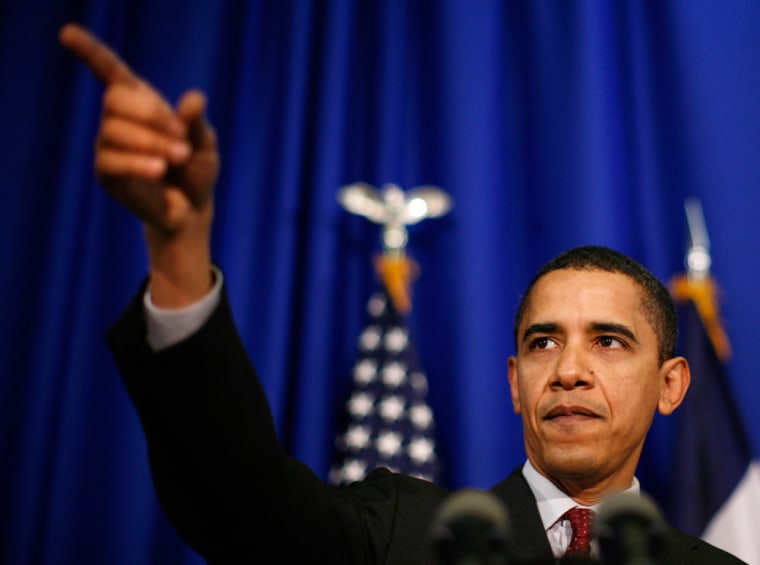Former president Bill Clinton leveled a new attack on Sen. Barack Obama on Friday, arguing that he lacked the experience needed to be president, a criticism that drew a tart response from Obama on Saturday as he campaigned in Waterloo, Iowa.
“When is the last time we elected a president based on one year of service in the Senate before he started running?” the ex-president asked, in an interview with PBS talk show host Charlie Rose which aired Friday night.
Obama began serving in the Senate in 2005.
The former president wondered whether voters are “prepared to roll the dice” on Obama, considering that he has less experience than his rivals for the Democratic presidential nomination Sen. Hillary Clinton or Sen. Joe Biden.
“Even when I was a governor and young and thought I was the best politician in the Democratic Party, I didn't run the first time,” Clinton said, referring to the 1988 campaign.
In response Obama told a press conference Saturday that Clinton himself had said in 1992 when he ran for president that a candidate can “have the right kind of experience or the wrong kind of experience.”
But unlike Obama, Clinton had been a governor for more than ten years, a reporter reminded Obama.
Obama cites 'over a decade' of experience
“And I’ve been involved in government for over a decade,” replied Obama.
The Illinois senator said he had "the experience that the country needs right now, of bringing people together, pushing against the special interests, of speaking to the American people about what needs to be done to move the country forward."
When asked about Sen. Clinton’s reference to possible “surprises” coming out about her rivals for the nomination, Obama said, referring to the senator and the ex-president, “The argument they’re making is that they’ve been around a long time. So whatever negative information is out there, people already know about. The assumption, then, is that lurking in other candidates’ pasts that haven’t been around for 20 years there might be something.”
But Obama said “I’ve probably been more reported on than any political figure in the country over the last year … I hardly think that I’ve been under-exposed during the course of this race.”
He added, “I understand there’s a history of politics being all about slash and burn…. I recall what the Clintons themselves called the ‘politics of personal destruction’ -- which they decried. My suspicion is that that’s just not where the country is at right now. They are not interested in politics as a blood sport; they’re interested in governance and solving problems” such as job creation and product safety.
In his Charlie Rose interview, Clinton portrayed Obama’s supporters as arguing that “what we want is somebody who started running for president a year after he became a senator because he's fresh, he's new, he's never made a mistake, and he has massive political skills. And we're willing to risk it.”
Clinton implied Obama was too much of a risk for the Democratic Party.
The John Edwards campaign has also been attacking Obama in recent days for his lack of experience.
“There’s a deep concern about his readiness to be president,” Joe Trippi, an advisor to Edwards, said Thursday.
Citing polling data on Obama — polling data apparently from the Edwards campaign — Trippi said “a quarter of his own supporters think he’s not qualified to be president.”
Edwards himself only served one term in the Senate and has no other experience in elective office.
On Saturday the Des Moines Register editorial board gave Clinton its endorsement.
The newspaper has a track record of backing the losing Democratic candidate in the Iowa caucuses.
In 1988 it supported Sen. Paul Simon who lost to Rep. Dick Gephardt. In 2000 it backed Bill Bradley who lost by a wide margin to Al Gore.
Four years ago the Register endorsed Edwards who finished a strong second to Sen. John Kerry in the caucuses.
Meanwhile, Clinton continues to amass votes from many of the more than 800 “super-delegates” who comprise nearly 40 percent of the number of delegates needed to clinch the Democratic nomination.
The super-delegate category includes Democratic governors and members of Congress and former presidents Clinton and Jimmy Carter.
In the last three days, Clinton has announced endorsements by super-delegates Gov. John Baldacci of Maine, Gov. Ted Kulongoski of Oregon, and Rep. Leonard Boswell of Iowa.
